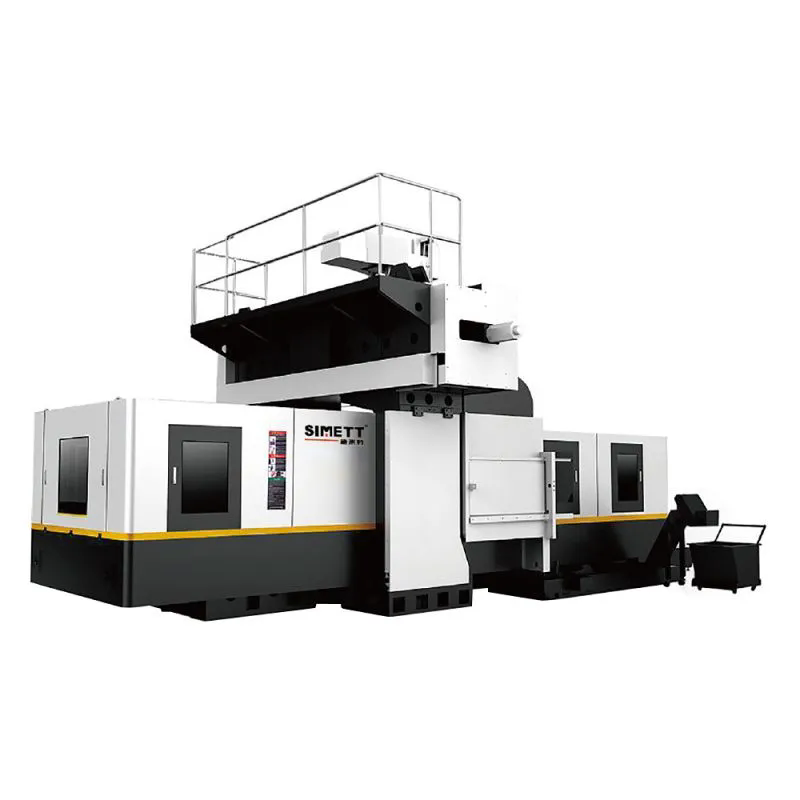What Makes a Machining Center Essential for Modern Manufacturing?
2024-12-07
In the world of precision manufacturing, efficiency, accuracy, and versatility are key factors in delivering high-quality products. One tool that has become indispensable for achieving these goals is the machining center. But what exactly is a machining center, and why has it become a vital piece of equipment in modern production environments? Let’s explore the essential role of machining centers and how they revolutionize the manufacturing process.
1. What Is a Machining Center?
A machining center is a highly automated machine tool that combines several processes into one unit, such as milling, drilling, tapping, and boring. These machines are designed to perform a wide range of machining operations, often without the need for manual intervention, which makes them crucial for high-precision and high-volume production.
Machining centers can be classified into different types based on their functionality:
- Vertical Machining Centers (VMC): These machines have a vertical spindle orientation, making them ideal for working with large, flat parts.
- Horizontal Machining Centers (HMC): These feature a horizontal spindle, which is ideal for cutting complex shapes and working on larger, heavier workpieces.
- Multi-axis Machining Centers: These machines can operate in more than three axes, allowing for even greater precision and flexibility in producing intricate parts.
2. Why Are Machining Centers So Important for Manufacturing?
Machining centers bring a multitude of benefits that make them essential for modern manufacturing:
- Increased Productivity: The ability to perform multiple operations without the need for tool changes or manual setup drastically reduces downtime and speeds up production times.
- Precision and Accuracy: Machining centers provide incredibly precise cuts and finishes, which are crucial for industries that require tight tolerances, such as aerospace, automotive, and medical device manufacturing.
- Automation and Reduced Labor Costs: With their advanced CNC (computer numerical control) capabilities, machining centers can operate with minimal human intervention, reducing labor costs and increasing overall production efficiency.
- Flexibility: These machines can handle a wide range of materials, from metals like aluminum and steel to plastics and composites, making them highly versatile for different industries.
3. What Are the Key Benefits of Using a Machining Center?
Using a machining center offers a host of advantages, including:
- Cost Efficiency: Despite the upfront investment, machining centers lead to cost savings by reducing labor, waste, and setup times.
- Higher Throughput: With their ability to perform multiple operations in one setup, machining centers increase the throughput of parts and reduce the need for additional processing steps.
- Enhanced Surface Finish: Machining centers deliver superior surface finishes that meet the highest standards of quality, particularly in industries like automotive and aerospace.
- Consistency: These machines ensure consistent part quality across all units, eliminating human errors that can occur with manual machining processes.
- Complex Part Capabilities: Multi-axis machining centers allow for the creation of highly intricate and complex parts that would be impossible with traditional machines.
4. Where Are Machining Centers Used?
Machining centers are used across many industries due to their versatility and precision:
- Aerospace: For producing high-precision components such as turbine blades and engine parts.
- Automotive: Used for manufacturing engine components, chassis parts, and other critical car parts that require tight tolerances.
- Medical Devices: For creating intricate components like surgical instruments, implants, and devices that require sterile and precise designs.
- Electronics: Used in the production of components for mobile phones, computers, and other electronic devices.
- Tool and Die Making: Machining centers are used to produce molds and dies for various industries, ensuring high accuracy and smooth finishes.
5. How Do Machining Centers Compare to Traditional Machines?
Machining centers stand out from traditional machines like lathes and mills in several key areas:
- Automation: Machining centers are equipped with CNC technology, enabling them to perform multiple operations automatically, while traditional machines often require manual setup and intervention.
- Multi-tasking: Unlike conventional machines that focus on one task, machining centers can perform milling, drilling, and tapping operations in a single setup, reducing the need for retooling and repositioning.
- Accuracy: While traditional machines require frequent adjustments to maintain accuracy, machining centers consistently produce parts with high precision, thanks to their advanced CNC controls.
- Cost-Effectiveness: Though machining centers may have a higher initial cost, their ability to perform multiple tasks in one setup and their long-term efficiency make them more cost-effective in the long run.
6. Are Machining Centers Right for Your Manufacturing Needs?
Whether you’re in the automotive, aerospace, or medical device industry, machining centers can streamline your production process. If you need to manufacture high-precision parts in large quantities with minimal human intervention, investing in a machining center is a smart decision.
Key considerations when choosing a machining center include:
- Material Requirements: Ensure the machine is capable of handling the materials your products require.
- Part Complexity: If your parts are complex or require multi-axis machining, opt for a multi-axis machining center.
- Production Volume: High-volume production runs will benefit from the increased speed and consistency provided by machining centers.
- Space and Budget: Machining centers are larger investments, so you’ll need to consider your factory’s layout and budget before making a purchase.
Conclusion
Machining centers are at the heart of modern manufacturing, offering a blend of precision, automation, and versatility that traditional machines simply can’t match. Whether you’re producing high-precision parts for aerospace, automotive, or medical applications, machining centers deliver efficiency and quality. If you’re looking to take your production to the next level, a machining center could be the key to staying ahead of the competition. Are you ready to optimize your manufacturing process with a machining center? The future of efficient, high-quality production is within reach!



